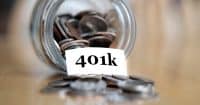Personal Finance
I can afford to contribute 15% to my 401(k) — but I'd rather contribute less. Is that foolish?

Published:

Contributing to a 401(k) is often billed as a surefire path to building wealth, with most experts recommending socking away money in this workplace retirement plan. One Reddit poster, however, isn’t convinced that a 401(k) is the best place for all of his funds to go. The Redditor commented that he could afford to contribute 15% to his 401(k) but didn’t really want to, preferring instead to put more money into a brokerage or savings account.
The big question is, would it be foolish not to deposit the full amount that was affordable into a 401(k)? And the answer may surprise you.
With so much emphasis on 401(k) contributions, it probably seems strange to hear that you shouldn’t always put every dollar you can into this account. But, there are actually some very good reasons to diversify.
First and foremost, most 401(k) accounts don’t have many investment choices. FINRA reports most plans offer between 8 and 12 choices. Some of these investments may have expense ratios that are on the higher side, such as target date funds. Your plan might also have administrative fees as well. When you pay fees on your retirement investments, this eats into your returns and leaves you with less.
Depending on what types of plans your workplace offers, you may also have just one choice: a traditional 401(k). These accounts provide a tax deduction in the year of your contribution, but withdrawals are taxable — and you usually can’t take money out until 59 1/2 without incurring penalties.
Because of these downsides, you may want to put at least some of your invested money into:
If you don’t have enough money to contribute 15% of your income to a 401(k) and do all these other things, then investing every dollar you can — at the expense of these other options — may not be the best choice.

When deciding how much of your money should go into your 401(k), there’s a simple question to ask: How much is your employer match?
If your employer matches a portion of your contributions, you should almost always put enough money into your account to earn the full amount of that match. Otherwise, you are leaving money on the table that comes to you risk-free and, depending on how your match works, that could provide as much as a 100% return on your investment.
In the case of the Reddit poster who asked the question, the poster actually said that the company matches 25% of all contributions, so in this particular instance, the Redditor most likely should actually put the full 15% of income that’s affordable into the account — unless he has no emergency savings or a lot of high-interest debt to pay.
For most people, though, a match is more limited. The company might, for example, match 50% of contributions up to 4% of your earnings — in which case you should invest a minimum of 4% of your earnings before considering a switch to another tax-advantaged retirement account.
Of course, deciding how to allocate your assets is a very personal choice. While it’s a good rule of thumb to try to claim all matching funds, you may also want to talk with a financial advisor if you aren’t certain how to balance competing priorities. That way, you can make the best choice for you so you can have the financial security you deserve now and in the future.
Start by taking a quick retirement quiz from SmartAsset that will match you with up to 3 financial advisors that serve your area and beyond in 5 minutes, or less.
Each advisor has been vetted by SmartAsset and is held to a fiduciary standard to act in your best interests.
Here’s how it works:
1. Answer SmartAsset advisor match quiz
2. Review your pre-screened matches at your leisure. Check out the advisors’ profiles.
3. Speak with advisors at no cost to you. Have an introductory call on the phone or introduction in person and choose whom to work with in the future
Thank you for reading! Have some feedback for us?
Contact the 24/7 Wall St. editorial team.